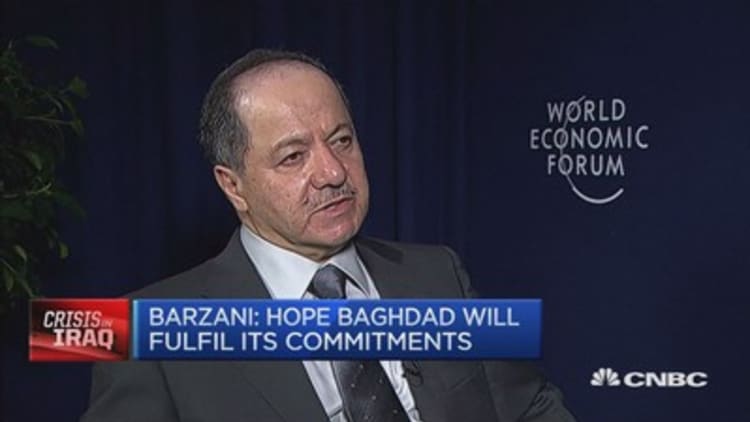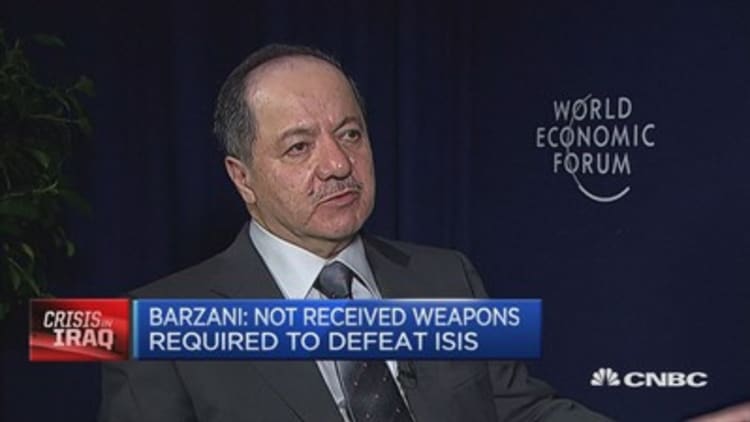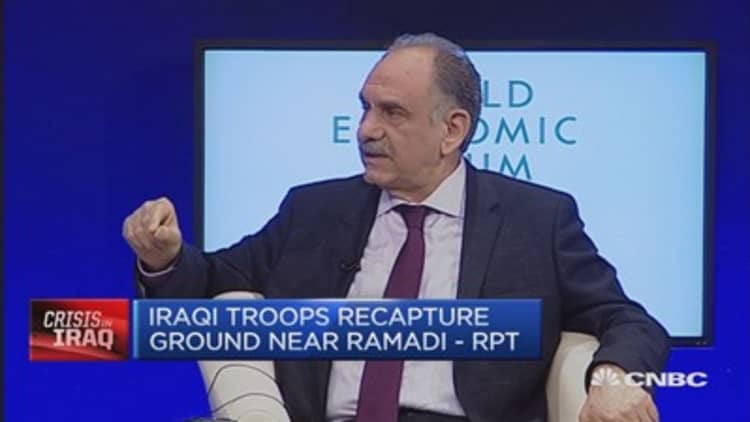
Iraq's semi-autonomous region of Kurdistan will sell its oil independently of Baghdad if the national government does not pay the money it owes, the president of the Kurdistan Regional Government told CNBC over the weekend.
Oil-rich Kurdistan, which has historically had a very tense relationship with the rest of Iraq, has been in dispute with the federal government in Baghdad since 2014 over oil exports and budget distribution. For the last year, national government funding for the region has been erratic, amid accusations that the region is selling oil without Baghdad's consent and failing to meet production quotas.
"Either Iraq will commit to the agreement that they have and will pay the Kurdistan region or, in another case, if they don't and fail to pay Kurdistan, then we will be selling our own oil and collecting our own revenue," Masoud Barzani, the president of the Kurdistan Regional Government, told CNBC from the World Economic Forum in Jordan.
Kurdistan has previously threatened to start independently selling its oil—despite doubts over whether it has the international clout to do so. However, Barzani said Saturday that the region would give Baghdad only "one or two more months" before taking action.
More weapons needed to fight Isis
As well as the dispute with the Baghdad, Kurdistan has been hit hard by the collapse in global oil prices and the insurgent Islamic State (ISIS), which has seen the region's population swell with refugees from fighting in Syria and other parts of Iraq.
ISIS continues to gain ground in Iraq, taking the city of Ramadi, which is about 30 miles west of Fallujah and 70 miles west of Baghdad, last week, from a far larger Iraqi force.
Read MoreThink life's hard? Try running a bank in Isis territory
On Sunday, U.S. Defense Secretary Ashton Carter said that the rout suggested that Iraqi government troops—which were trained by the U.S.—lacked the will to fight.

Barzani added to the criticism of Iraq's armed forces, telling CNBC that sectarianism meant soldiers lacked the impetus to defend their country.
"The problem is actually with the previous regime in Iraq that provided an environment for the sort of problems that we see in the Iraqi military," he said.
"The way that they managed the Iraqi military… unfortunately changed the national army to a more sectarian army and those people that were supposed to fight for the country didn't really have the cause and that was the main reason why the Iraqi military wasn't able to succeed."
Read MoreHas poor governance in the Middle East aided Isis?
Barzani said that further commitment from the international community was needed to defeat Isis.
He praised the U.S.'s support overall, but said that Kurdistan had not received the weaponry it needed.
"We are very grateful and thank the United States for the support that they provided to Kurdistan. Unfortunately in terms of the weapons, we have not really received the kind of equipment that we demand and is required to fight and defeat Isis," he told CNBC.
"I have raised this issue with the administration and other government officials and we are hopeful that they will respond positively and there will be some changes in this regard," Barzani later added.
Also at the World Economic Forum, Iraqi deputy prime minister Saleh al-Mutlaq, said the country needed more international assistance in combating terrorist activity.
"The whole of Iraq should be a red line; Isis should not be able to take it over. This is the new strategy the international coalition should follow in the region. They should not just make strikes here and there that are ineffective," Saleh al-Mutlaq told CNBC.



